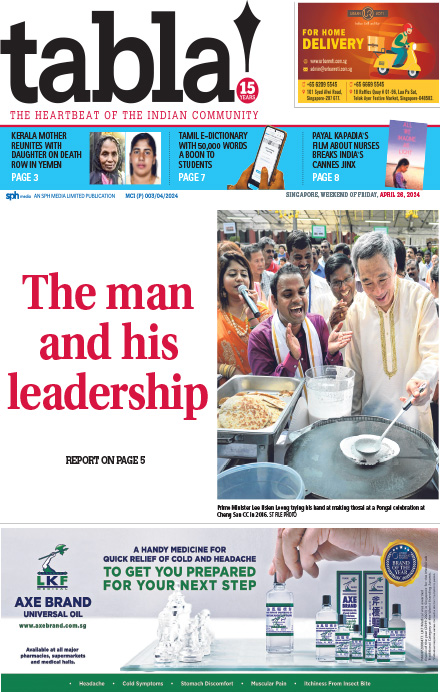Pongal has grown over time in Singapore to become all inclusive, regardless of community or religion.
The four-day South Indian harvest festival, which coincides with the Makar Sankranthi largely celebrated in North India, is not a traditional celebration for Mr Naseer Ghani, 63, an educator and grassroots organiser.
But he does celebrate the day in his home with his Hindu friends and helper. In his roles as a teacher and a leader of the West Coast Indian Activity Executive Committee, Mr Ghani has been instrumental in organising Pongal celebrations among residents in the West Coast.
"I enjoy a similar pluralism in my own home," he said. "My family helpers serve us pongal (boiling rice in a pot) and a sumptuous vegetarian feast."
His wife Mumtaj Bivi, 57, a Tamil teacher who routinely organises Pongal celebrations in her school, said that her mother, who emigrated from Tamil Nadu to Singapore in the 1950s, often took part in the events associated with the festival along with Tamil Hindus.
"She used to cook ven pongal (white lentil rice dish) and sakkarai pongal (sweet lentil rice dish) for us," said Mrs Mumtaz.
Mr Ghani, who grew up in Alexandra estate, said that in his younger days there were several cultural and sporting events during Pongal. He and his friends helped set up booths and participated in the festivities.
His son Ameer Roshan, 29, enjoys celebrating Pongal with his friends.
Two years ago, the family grew sugarcane, traditionally associated with the festival, in their garden.
"Eating sugar cane from our own family garden made my Pongal very special," he said.
His wife Zainabah Beevi, 28, likes to prepare different vegetable dishes and serve them to elders during the festival. "We also ask everyone, regardless of religion, to join in the Pongal celebrations," she said. "It is only befitting of such special days to be inclusive."
For Mrs Kalyani Naganathan, 72, Pongal this year, which was celebrated from Jan 14 to 17, meant a long awaited family reunion.
She hails from Tiruchirappalli district in Tamil Nadu, while her extended family members are come from various parts of India. All of them gathered at a flat in Ang Mo Kio.
Her son Varadharajan, who has been working in a bank in Singapore for the past six years, married Ms Anusha Srinivasan from Hosur in Tamil Nadu two years ago.
But the family could not hold the ritual of the new daughter-in-law handing over the Pongal "seer" (a pot with grains) previously because of the Covid-19 restrictions.
"This is a meaningful rite of passage and I am glad it happened in my flat this year," said Mrs Kalyani, a homemaker.
The family celebrated Kanum Pongal (thanksgiving) last Sunday.
"Kaanum Pongal, or Kanni Pongal, is also celebrated to reaffirm bonds between brothers and sisters and is similar to the concept of Raksha Bandhan in North India," she said.
"On this day, brothers and sisters give each other gifts and pray for one another's well-being."
Several dishes are made on the eve of Pongal which is called Bhogi, revealed her daughter Vishalakshi Naganathan, 41, a tuition teacher.
"On this day, a sweet dish called Poli is traditionally made by Brahmins," she said. "Other dishes are made from pumpkins, peas and beans because such vegetables are harvested during the Thai month (mid-January to mid-February)."
Her husband Ravikumar Jambunathan, 47, said that, among the many festivals he celebrates, Pongal remains close to his heart.
"It is a festival where we thank everyone from the sun to the animals," he said. "While thanking has a religious element, the festival itself does not have any religious origin and people from all creeds and communities celebrate it."



